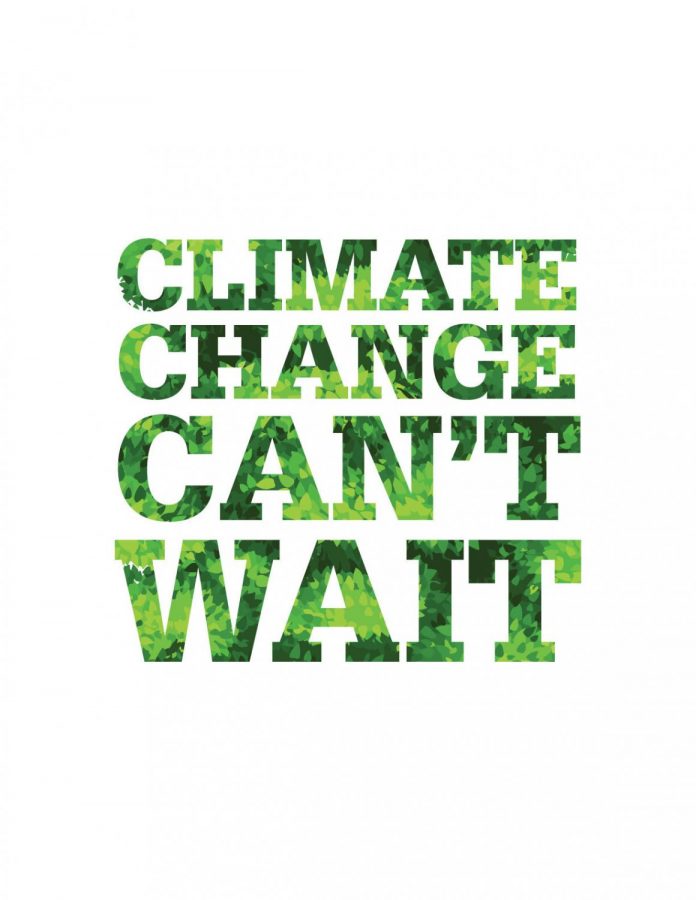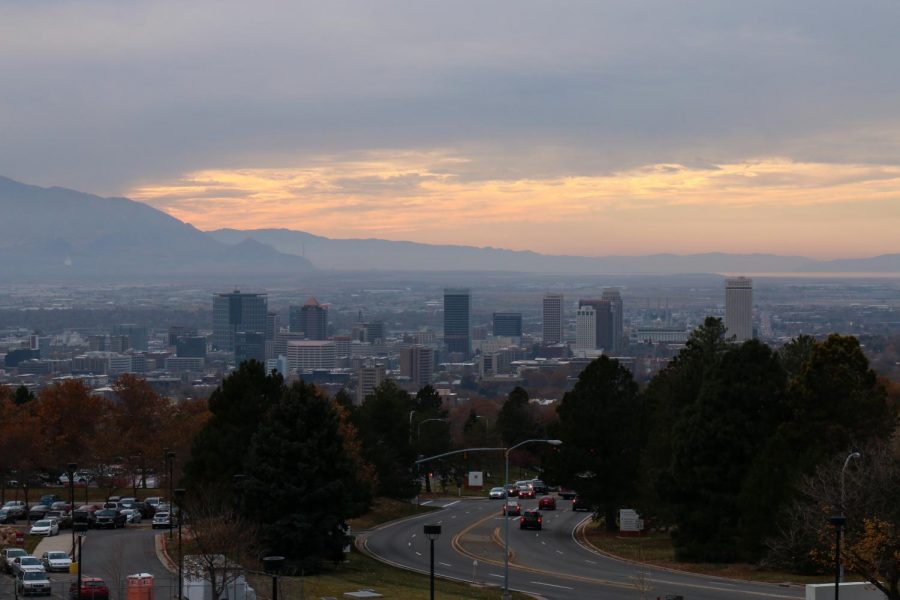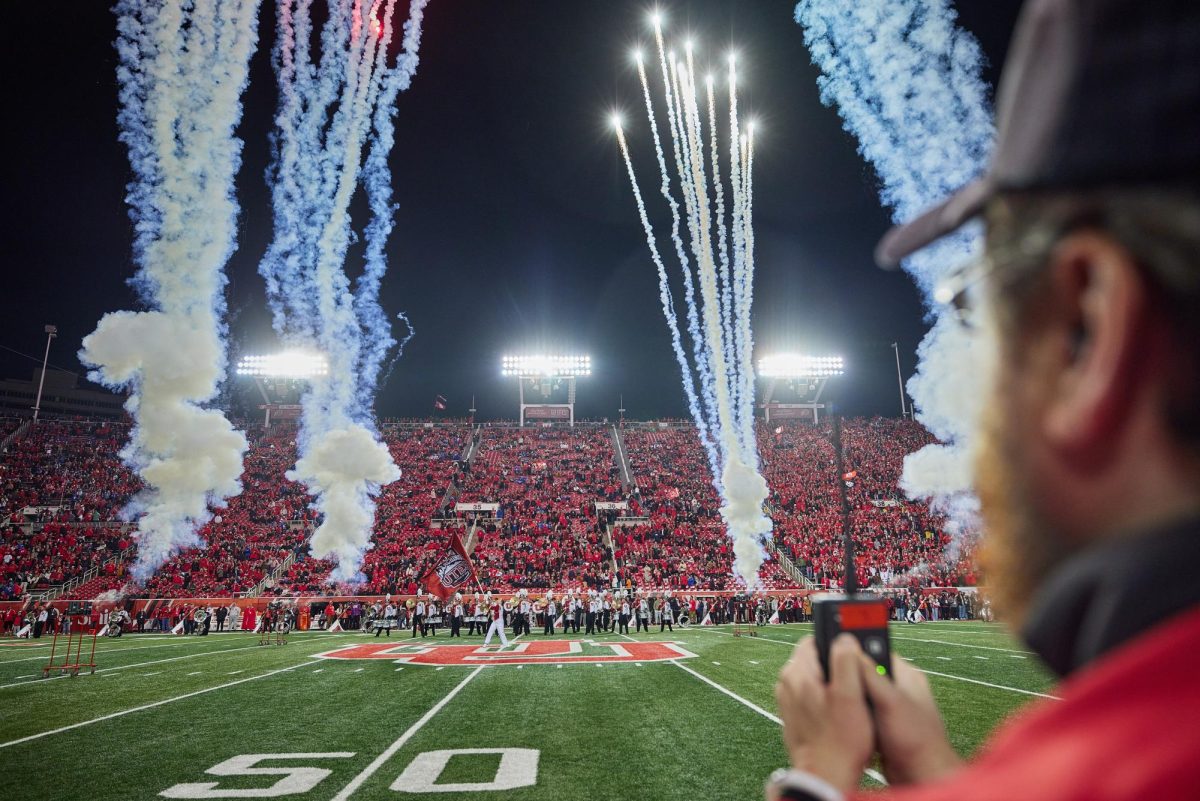Lien: Climate Change Won’t Go Away Without Our Help
May 20, 2022
On Earth Day, climate activist Wynn Alan Bruce self-immolated in front of the Supreme Court to protest the inaction done regarding climate change. The media almost totally ignored Bruce’s death, with others calling the coverage “muted.”
On April 6, three scientists belonging to Scientist Rebellion handcuffed themselves to a JP Morgan Chase building in LA to protest the bank’s funding of fossil fuel projects, and at least 100 cops in riot gear removed them.
Recently, climate change protests have increased in number and attendance. With each new and dismal report, climate change grows in imminence. With consequences other than melting polar ice caps, climate change warrants immediate action as it affects everything.
Climate Change in Utah
Climate change in Utah can cause more than droughts and a higher fire hazard. We may see an increase in the likelihood of other natural hazards, such as avalanches, landslides and flooding. The physical health of many individuals is also at stake. A warming planet can induce higher rates of respiratory diseases, while high heat and low precipitation fosters the growth of allergens and can trigger respiratory illnesses.
Andrea Brunelle, Chair of the Department of Geography at the University of Utah, said that “as temperatures rise, and there’s these heat waves, people will just die from heat because they can’t cool themselves down.” Brunelle believes that global warming “is the most urgent problem that we need to deal with globally, right now.”
Utah’s economy isn’t safe either. The ski industry and the agricultural industry are already in danger, and mountain guides feel climate change’s effects in their workspace. A study from Nature Reviews Earth and Environment claims our mountain ranges could see little to no snow in 35 to 60 years, which could drastically curb the billion dollar ski industry. With the loss of snow comes the loss of potable water, and we already deal with the drought.
Mental Health
Aside from physical consequences of global warming, climate change can harm a person’s mental health. Climate grief (or ecological/environmental grief) describes the feelings of loss and sadness stemming from the state of the world, as well as the grief felt in relation to experienced or anticipated ecological losses. The high risk groups for this psychological reaction are young people, Indigenous communities and environmental scientists. Evidence colludes to climate change as a source of “increased behavioral and mood disorders, depression and anxiety, suicide ideation and suicide,” among other mental illnesses.
Opposite climate grief is “climate apathy,” a form of climate change denial suggesting that global warming doesn’t matter and prioritizes convenience over sustainability. In a study done by the European Social Survey, an “overwhelming majority” of participants accepted climate change as an issue and acknowledged that it started because of humans, but most didn’t care to change their behavior and had no strong concerns regarding the issue. Climate apathy can convince a population of the unimportance of global warming, posing a threat to those working towards alleviating the issue.
The People with Power
As a detrimental problem, climate change doesn’t matter to those who have resources to help reverse it. For example, Elon Musk claimed that climate change is “the biggest threat that humanity faces this century.” However, he turned down a climate change collaboration with Bill Gates because Gates allegedly “shorted” Tesla on half a billion dollars. He also “dismissed the idea of improving existing public transit,” which could improve air quality, accessibility and traffic safety.
Other powerful and wealthy people who make grand announcements about saving the planet continue to act shadily behind the scenes. Jeff Bezos pledged that he would commit $10 billion to combat climate change through grants, which is only 7% to 8% of his total income. Furthermore, the source of his wealth pursues oil companies and drives greenhouse gas emissions higher.
In theory, these so-called philanthropists invest money to foster change and support sustainability. But in practice, none of their efforts pan out. Average people can and should do what they can toward living more sustainably, but the real pressure lies with those who have resources to aid climate change, including corporations that inevitably cause a worsening environment.
Climate change hurts the world and its imminent dangers are felt throughout many different communities of people. Those who can help the planet should contribute to climate activism more than the average person. Brunelle said, “The way that [climate change has] been portrayed historically, as more of a debate, has been misleading to the general public, and it makes them feel like they get to have an opinion on it. They can decide to care or not, but it’s happening, whether they want to believe it or not.”













John Hedberg • Jun 4, 2022 at 9:14 am
Here’s my question: is global warming really an emergency?
There are ancient cities near Istanbul that have been found totally submerged, where people obviously used to live. Since the end of the last major ice age, temperatures have gradually tended higher, along with sea levels. Even without much science or techno-savvy, people and species adapted just fine.
The Obama’s (smart people, obviously) just bought a waterside estate on Martha’s Vineyard, so they don’t believe in any imminent climate peril. I see serious peril when it comes to species and habitat loss through thoughtless development, and I’m worried about all the trash in the oceans. Global warming doesn’t really seem too imminent as a peril, not when most of the planet’s arable landmass is presently sub-arctic, and we gain 3 acres of new land up North for every acre we lose on the equator. People can grab a bus, and we can bring along all the flora & fauna as we settle all the Green New Places up North.
That said, I’m for renewable carbon-free energy at a pace that won’t bring famine, economic collapse, and war (these always seem to go together: have you ever noticed?). It seems perfectly reasonable to rely on natural gas more as we transition away from coal and oil, and toward nuclear, wind, solar, tidal, and geothermal sources. We haven’t even figured out how to store the intermittent energy from wind & solar yet, so STEM majors still have a lot of work ahead. In the mean time, we can plant more trees, preserve wilderness from thoughtless development, and start moving people and resources North into the new habitable zones. It doesn’t have to happen overnight, so slowly greening up the North as we migrate and transition from carbon seems like it should solve the problem.
Meanwhile, the speed of global warming doesn’t seem so threatening that the Obama’s are buying beach property on Hudson Bay. When Sasha and Malia start buying property in Greenland, maybe then it’ll be time to call it an emergency.
Just a point of view. 70 years ago, scientists thought the Earth was going into a period of global cooling. Take everything one step at a time.
Best Regards,
J Hedberg
John Hedberg • Jun 4, 2022 at 9:04 am
“Re-Tweet”
I feel what you’re writing about. Regarding “existential dread” about Climate Change, we’re not alone. During the 1950’s, 60’s, 70’s, and 80’s, students lived under the unending dread of impending Nuclear War, which was expected to obscure sunlight and lead to Nuclear Winter, a different kind of climate change that also included radioactive fallout and horrific birth defects among any survivors. It didn’t happen, but people were sure scared!
Tools to help us?
1. There’s something viscerally natural and positive about in-person socializing. Turn OFF your phone. Spend time with people and friendly animals.
2. Go for a walk. Exercise (and sunlight) stimulates areas of the brain which resist and reverse depression & anxiety. The seasonal colors are very stimulating. Get a group together, and go for walks outdoors several times a week. We’re literally right next to premium mountain trails. You’ll breathe better, that’s for sure!
3. Sing. Play an instrument. Listen to live (acoustic) music. These tap something deep and pleasing on both an emotional and intellectual level, and it’s another reason to be together in person. You’ll feel more relaxed.
4. Go to a dance. It’s fun, it’s exercise, it’s social, and you’ll be making your body more oxygen-efficient with every step, so you’ll sleep better. You may even laugh!
5. Pray/meditate/connect with spirit. If you can find and connect with a Greater Love through meditation or prayer, you’re no longer alone, and there’s a reason to smile every time you close your eyes.
6. Try looking at the bright side of global warming. Most of the planet’s land is Arctic permafrost, so the Great North (Canada, Greenland, Russia) is beginning to turn green, and those new plants LOVE CO2 levels. We can transport wildlife and agriculture North over a generation or two, and by the time we’re having our 50th Wedding Anniversaries, our grandkids will have stabilized or even reversed temperature vectors, and we can celebrate together at the new beach house in Thule.
So many fears in my parents’ generation turned out to be OK, despite all students’ worst expectations, so seek the fun and enjoyment in life and each other (phone OFF) while we work and grow together, and burn off stress having a good time together while we solve a few life puzzles, like every new generation does. Deal?
Love You Guys!
All the Best,
J Hedberg